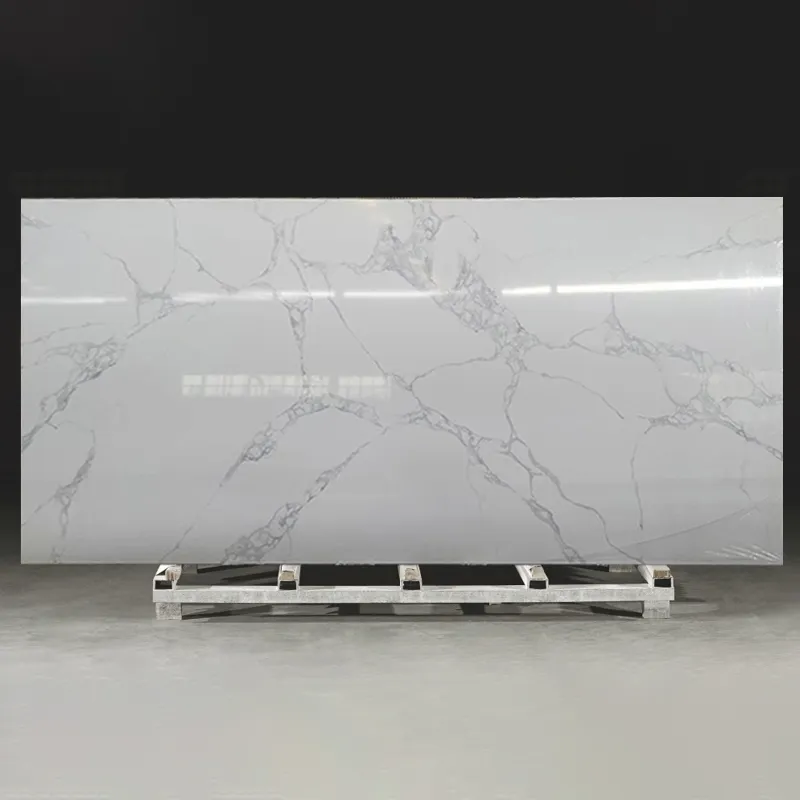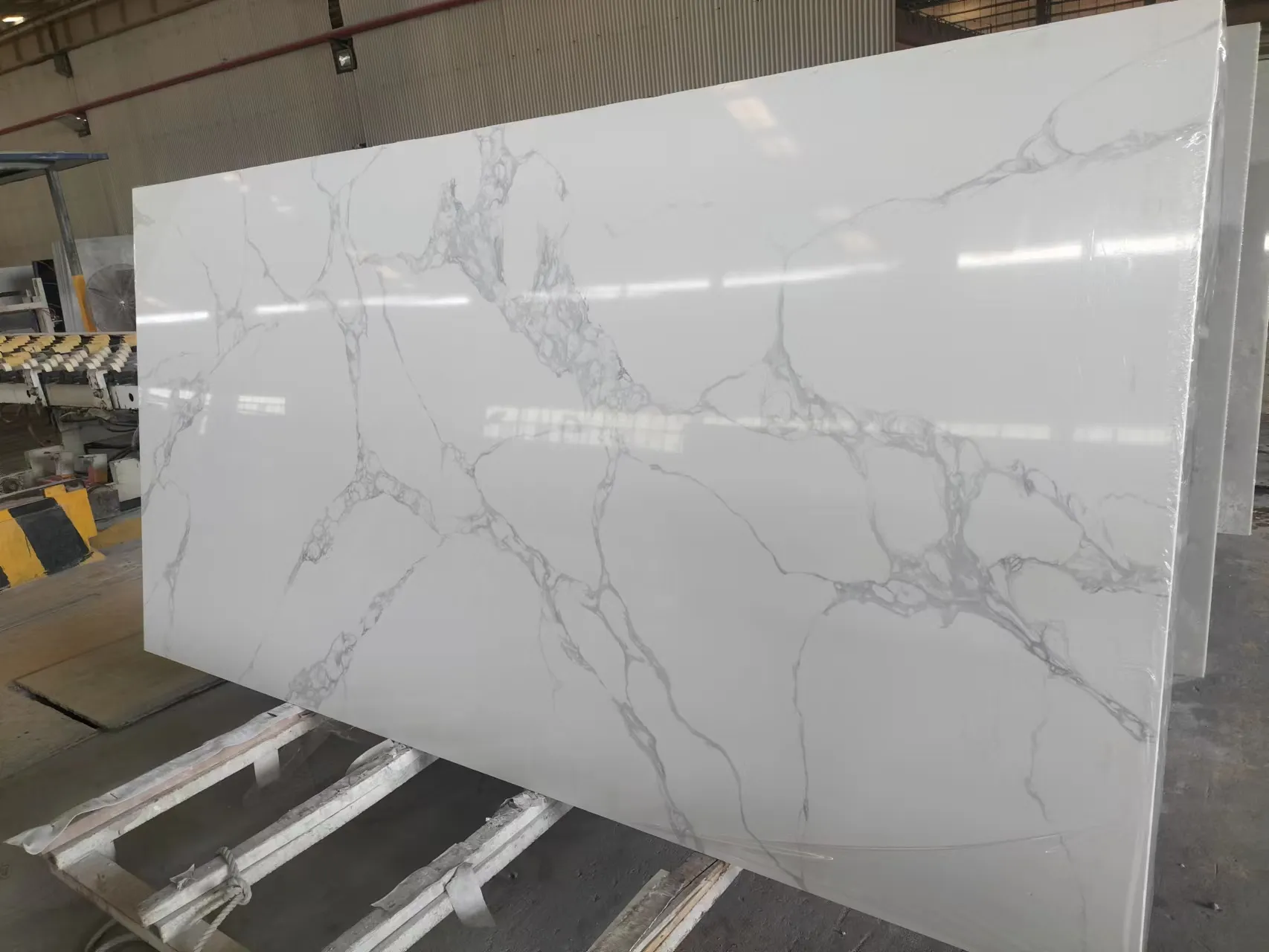In modern home decoration, quartz countertops have become the first choice for many family kitchens and bathrooms because of their beauty, durability and easy maintenance. Quartz countertops not only have excellent stain resistance, scratch resistance and heat resistance, but also provide a variety of color and texture options to match a variety of interior design styles. When purchasing a quartz countertop, understanding its weight is a crucial step, especially for design, construction and installation work. The weight of the countertop will affect the choice of supporting structure and the technical requirements of installation.
For ordinary home decoration, there are two common options for the thickness of quartz countertops: 2 cm (CM) and 3 cm (CM). This article will focus on 2CM thick quartz countertops, explore their weight per square foot, and deeply analyze the impact of weight on installation and use.

How much does a 2CM quartz countertop weigh per square foot?
Material composition of quartz countertops
Quartz countertops are made of natural quartz particles mixed with resin materials. Quartz is a hard mineral with a Mohs hardness of up to 7, which makes quartz countertops extremely durable. Resin acts as a binder, not only fixing the quartz particles together, but also giving the countertop a certain elasticity, achieving an ideal balance between strength and durability.
The material ratio of quartz countertops is usually about 90% to 95% natural quartz particles, plus 5% to 10% resin and colorant. This material composition makes quartz countertops not only strong and durable, but also relatively light compared to some natural stones such as granite and marble.
The relationship between weight and density
In order to calculate the weight per square foot of a 2CM quartz countertop, we need to understand the density of the quartz countertop. The density of quartz is about 2.65 grams per cubic centimeter, while the density of engineered quartz countertops is slightly different due to the addition of resin, usually between 2.3 and 2.4 grams per cubic centimeter.
Based on this density range, we can calculate the weight per square foot of a 2CM thick quartz countertop by the formula: Weight = Volume × Density
Volume calculation of quartz countertop per square foot
First, you need to calculate the volume of a 2CM thick quartz countertop per square foot. 1 square foot is about 929 square centimeters and 2CM thick, so the volume of 1 square foot of 2CM thick countertop can be calculated as: Volume = 929 × 2cm = 1858
Then, multiply the volume by the density of the quartz countertop (taking the middle value of 2.35 grams/cubic centimeter), and you can get the weight per square foot: Weight = 1858 × 2.35g/=4366.3g=4.366kg
Therefore, the weight of a 2CM thick quartz countertop is about 4.366 kilograms per square foot, which is about 9.63 pounds in pounds.
What factors affect the weight of quartz countertops?
Slight differences in material density
The weight of quartz countertops is mainly determined by the density of quartz and resin, and different brands and production processes may cause slight differences in material density. Some quartz countertops have a lower density, which may be slightly less than 2.35 grams/cubic centimeter, while some high-end countertops may have a slightly higher density due to the use of high-quality resins. Therefore, the weight per square foot will also vary depending on the brand and material.
Impact of Thickness
Although this article focuses on 2CM thick quartz countertops, it is worth noting that the thickness of the quartz countertop directly affects its weight. Common quartz countertops are 2CM and 3CM thick, and 3CM thick countertops are relatively heavier. If higher strength and durability are required, 3CM thick countertops may be a better choice, but at the same time, this also means that the supporting structure must be able to withstand more weight.
In contrast, 2CM thick countertops are relatively light, so in some cases, 2CM quartz countertops may be used in occasions that do not need to withstand excessive weight, such as small kitchens or bathrooms.
Countertop Shape and Cut Design
Quartz countertops are usually cut and customized according to customer needs. If the countertop is designed with a sink, stove cutout or other decorative cutouts, the actual weight of the countertop will be reduced by these cutouts. The area of each cutout is different, and the weight reduction is also different, but it usually has little effect on the overall weight of the countertop.

What effect does weight have on installation and support structure?
Necessity of Support Structure
Although 2CM thick quartz countertops are lighter, their installation still needs to consider the load-bearing capacity of the support structure. Usually, quartz countertops are installed above cabinets, and whether the material and structure of the cabinets can bear the weight of the countertops must be considered. Especially on larger countertops, such as kitchen islands or long-distance worktops, the stability of the support structure is particularly important.
Generally speaking, 2CM thick quartz countertops are not as heavy as 3CM countertops, so the requirements for the support structure are relatively low, but it is still necessary to ensure that the cabinet frame is sturdy during installation. If the design is a cantilever countertop, especially the unsupported suspended part, the weight will have a more obvious impact on the installation, and additional support devices such as brackets or steel beams may be required.
Countertop size and weight distribution
The total weight of the quartz countertop varies with the size of the countertop in different kitchen designs. Although the weight per square foot is controllable, the accumulation of weight can be considerable for large countertops. For example, a 10-square-foot 2CM thick quartz countertop will weigh about 43.66 kg (96.3 pounds). Therefore, when designing and installing large-area countertops, the safety and reliability of the supporting structure must be guaranteed.
Installation Tips and Precautions
A professional construction team is required to install quartz countertops. Because of their heavy weight and high fragility, non-professional installation may cause cracks or other damage to the countertops during handling and installation. During installation, workers need to move the countertops carefully to avoid deformation or damage to the countertops due to gravity.
What effect does the weight of quartz countertops have on daily use?
Stability of countertops
The weight of quartz countertops has its advantages in daily use. Due to their large mass, the countertops are very stable and not easily affected by external shocks. Whether it is cutting ingredients, placing heavy objects, or daily cooking operations, the weight of quartz countertops makes them highly resistant to vibration, reducing the risk of accidental sliding or tilting.
Ease of cleaning and maintenance
Although quartz countertops are heavy, they do not increase the difficulty in daily maintenance and cleaning. The smooth surface of quartz countertops is easy to clean and not easy to attach stains and bacteria. Therefore, although the countertop itself is heavy, users do not need to worry about the complexity of its maintenance. Just wipe it with a damp cloth to keep it clean and bright.

How to choose the appropriate thickness of quartz countertops?
For consumers, when choosing the thickness of quartz countertops, it is necessary to comprehensively consider the beauty, durability, and difficulty of construction and installation. 2CM thick quartz countertops are the first choice for many families because of their relatively light weight, especially when a larger countertop is required.
2CM thickness for small kitchens and bathrooms
For families with small kitchens or limited countertops, 2CM thick quartz countertops are an ideal choice. The lighter weight makes construction and installation more convenient, and it will not cause too much pressure on the kitchen structure.
Advantages and application scenarios of 3CM thickness
If the countertop needs to bear a large weight, such as frequent use of heavy kitchen utensils or a large number of cooking operations on the countertop, 3CM thick quartz countertops may be a better choice. Although the 3CM countertop is heavier, its extra thickness provides stronger resistance to bending and durability, which is particularly suitable for high-frequency kitchen environments.
Through the above analysis, the weight of a 2CM thick quartz countertop is about 4.366 kg per square foot, equivalent to 9.63 pounds. The material composition, thickness, size and other factors of the quartz countertop will affect its total weight, but in general, the 2CM thick quartz countertop has a lighter weight and excellent durability, which is a very cost-effective choice for home decoration. During installation and use, consumers need to reasonably consider the support structure of the countertop to ensure the safety and stability of the countertop.
At Foshan Rongguan, we pride ourselves on providing affordable building materials without compromising on quality. From quartz surfaces to clay tiles, our products cater to diverse architectural needs. Whether you are looking for low prices or unique, customized designs, our factory-direct sales offer unmatched value. Explore our latest promotions and purchase today for exclusive benefits!

